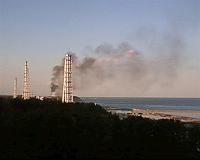 |
Washington (UPI) Apr 12, 2011 Miniscule amounts of radiation from Japan's nuclear emergency have reached the United States but Environmental Protection Agency Administrator Lisa Jackson assured U.S. lawmakers Tuesday that those amounts were well-monitored and far below dangerous levels. Jackson told the U.S. Senate Committee on Environment and Public Works that radioactive material in the United States in the aftermath of the March 11 earthquake that damaged Japan's Fukushima Daiichi nuclear complex has been found to be "100,000th" of the radiation Americans receive daily from natural sources such as minerals found in the ground. Even with "a blip" in the background radiation, Jackson said state agencies are alerted so there are no surprises. The largest amounts of radioactive material were found in Alaska during the week of April 4 but even those weren't at a level that should concern U.S. citizens, Jackson said. Samples of milk taken March 28 in Phoenix and Los Angeles revealed a small amount of radioactive material that was more than 1,500 times lower than levels set by the U.S. Food and Drug Administration. Though Jackson admitted that there are newer monitors available that detect more radioactive particles, she said that the monitors used in EPA's RadNet system suit their current function of providing broad levels of monitoring for "events that are already known." RadNet is EPA's radiation monitoring system, composed of 124 stationary and 40 deployable air monitors that the agency ships to needed areas in the United States. In her prepared testimony, Jackson wrote that RadNet monitoring equipment is used to watch for contaminants and also to look for "localized radiation" at the site of an incident. The data collected by RadNet are collected in an online database accessible to the public through EPA's Web site. Jackson also spoke about the Clean Air Act and a recently proposed rule to limit Mercury and other toxins that are emitted by fossil fuel energy plants. She quoted an annual estimate of "tens of thousands" fewer bronchitis incidents, 150,000 "fewer visits to asthma-related doctors" and tens of thousands avoided deaths as a result of air pollution. Additionally, Jackson claimed the Clean Air Act saved "$2 trillion in avoided healthcare costs and benefits between 1990 and 2020, alone." Gregory Jaczko, chairman of the Nuclear Regulatory Commission, told another Senate committee last week that the NRC will review safety at the 104 U.S. nuclear reactors. In hi8s prepared remarks Tuesday, Jaczko said: "In light of the events in Japan, there will be a near-term evaluation of (NRC responsibilities for licensing and oversight) relevance to the U.S. fleet and we are continuing to gather the information necessary to take a longer, more comprehensive and thorough look at the events in Japan and their lessons for us. "Based on these efforts, we will take all appropriate actions necessary to ensure the continuing safety of the American people."
Share This Article With Planet Earth
Related Links Space Technology News - Applications and Research
 Russia Urges Japan To Stop Radioactive Dumping Into Pacific
Russia Urges Japan To Stop Radioactive Dumping Into PacificMoscow (RIA Novosti) Apr 11, 2011 Russia hopes that Japan will disclose full information about the situation at the crippled Fukushima nuclear power plant and will stop dumping radioactive water into the Pacific Ocean, the Foreign Ministry said on Thursday. "We hope that our Japanese partners will provide all interested parties with complete information about the radiation situation in the area around the Fukushima nuclear ... read more |
|
| The content herein, unless otherwise known to be public domain, are Copyright 1995-2010 - SpaceDaily. AFP and UPI Wire Stories are copyright Agence France-Presse and United Press International. ESA Portal Reports are copyright European Space Agency. All NASA sourced material is public domain. Additional copyrights may apply in whole or part to other bona fide parties. Advertising does not imply endorsement,agreement or approval of any opinions, statements or information provided by SpaceDaily on any Web page published or hosted by SpaceDaily. Privacy Statement |